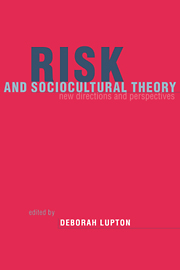Book contents
- Frontmatter
- Contents
- List of contributors
- Introduction: risk and sociocultural theory
- 1 Postmodern reflections on ‘risk’, ‘hazards’ and life choices
- 2 Fear of crime and the media: sociocultural theories of risk
- 3 Risk and the ontology of pregnant embodiment
- 4 Risk anxiety and the social construction of childhood
- 5 Constructing an endangered nation: risk, race and rationality in Australia's native title debate
- 6 Risk, calculable and incalculable
- 7 Ordering risks
- Index
7 - Ordering risks
Published online by Cambridge University Press: 16 September 2009
- Frontmatter
- Contents
- List of contributors
- Introduction: risk and sociocultural theory
- 1 Postmodern reflections on ‘risk’, ‘hazards’ and life choices
- 2 Fear of crime and the media: sociocultural theories of risk
- 3 Risk and the ontology of pregnant embodiment
- 4 Risk anxiety and the social construction of childhood
- 5 Constructing an endangered nation: risk, race and rationality in Australia's native title debate
- 6 Risk, calculable and incalculable
- 7 Ordering risks
- Index
Summary
Introduction
Risk phenomena and sociocultural theory have developed a close reciprocal relationship during the past two decades. The defining text of the first defining form of the relationship is Douglas and Wildavsky's (1982) essay interpreting the expanding risk anxieties of the contemporary United States from the perspective of cultural anthropology. That of a second form is Beck's (1992) ‘sociological diagnosis of the times’ (Lash, 1994: 118) which placed risk phenomena at the heart of a transformed and radicalized modernity. To oversimplify to the point of injustice, the first form offers a ‘sociocultural’ account of risk processes while the second advances a ‘risk’ account of sociocultural processes. It will be argued that this distinction can only be analytic, that risk phenomena do structure, or ‘order’, sociocultural relations but under conditions in which broader sociocultural patterns, or ‘orderings’, have already structured risk phenomena.
The argument draws on two other related literatures that have contributed to recent discussions of risk and order. The first is the analysis of ‘governmentality-government’ and ‘regulation’ in work deriving from Foucault (1991) (see Burchell, Gordon and Miller, 1991 and Barry, Osborne and Rose, 1996a). The second is Law's (1994) discussion of the sociological problem of ‘order’ with its injunction that we must abandon ‘the idea that there is a single order … the dream or the nightmare of modernity’ (2). For Law, as for other ‘actor network’ analysts, ‘perhaps there is ordering, but there is certainly no order’ (1) (see also Latour, 1993).
- Type
- Chapter
- Information
- Risk and Sociocultural TheoryNew Directions and Perspectives, pp. 160 - 185Publisher: Cambridge University PressPrint publication year: 1999
- 25
- Cited by



